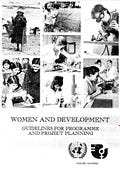Women and development
In today’s Cardijn Reflection, we recall the life and work of American YCW leader, Caroline Pezzullo, who represented the movement at the United Nations in New York and later became a noted expert in the field of women and development.
Caroline’s biography on the Joseph Cardijn Digital Library tells her story as follows:
Caroline was born and raised in Brooklyn, NY. Her interest in social justice led her to join the Young Christian Workers in her youth. Her experience working in development transformed into a commitment to empowering grassroots women globally.
In the mid-1980s she became leader and board member of the National Congress of Neighborhood Women (NCNW), where she co-designed the Annual Institute on Women and Community Development. Caroline’s vision of a network of grassroots women’s organizations that would act and speak on their own behalf in global development arenas became Grassroots Organizations Operating Together in Sisterhood (GROOTS).
Her experience allowed her to effectively support GROOTS member’s efforts to gain access and recognition in important venues, culminating in the first grassroots Women’s Tent at the 1996 NGO Forum in Huairou, China, where more than 1000 grassroots women socialized, led workshops on their development approaches, and met key decision-makers. Caroline was a founding member of Women’s World Banking and chaired for several years the NGO committee on Human Settlements at the UN.
She pressed for and won the creation of a Women and Habitat Program within UNHABITAT, and helped found the Huairou Commission. In 2000 UNHABITAT honored these efforts by awarding her with the Habitat Scroll of Honor.
This kitchen at the Neighborhood Women House, Living and Learning Center, is named after Caroline Pezzullo for her lifetime commitment to helping poor and working class women gain political, social and economic equality.
She also wrote a set of guidelines on project planning and development entitled simply “Women and Development” for the UN.
Caroline writes:
Women at all levels of responsibility have always been involved in activities for the improvement of the quality of life of their families and communities. Women have not, however, been integrally involved in the national development processes of most countries.
There is increasing recognition that “any measures for women isolated from the major priorities, strategies and sectors of development cannot result in any substantial progress towards the goals of the Decade” i.e, Equality, Development and Peace, with particular emphasis on employment, health and education.
At the same time, it should be stressed, that “because of women’s long historical disadvantaged position in society, there is need for specific transitional strategies, policies, measures and actions, if they are to actively participate in the execution of the objectives set forth by the countries of the region… The specificity of women’s situation and the need for special programmes by and for them should not isolate them from the national process of social/economic and political development… It is not only urgent for them to acquire the skills and tools for designing and implementing women’s programmes/projects; it is also a necessary condition for their further development, to know how those programmes/projects must become a part of the national development plan of each country.”
The purpose of these GUIDELINES is to assist women in planning programmes and projects that advance the status of women and at the same time, provide the links necessary to ensure their participation in the development process at the community, national, regional and international levels.
An essential part of this strategy is to involve rural and urban women, particularly from low-income areas, in the decision-making process which affects their opportunities and the quality of their lives.
Professional women with organizational responsibilities have valuable information which must be shared with community women. At the same time planning and decision-making must include the much-needed practical information which community women have to contribute. The institutional framework should be created or improved to permit this kind of participation on a broad basis. In the process, appropriate links must be made between the community and national policy and programme levels.
See judge act for development
But how does she propose to achieve this? By following the see-judge-act process, which she explains as follows:
Underscored in the GUIDELINES as essential elements for women to become involved in the development process as free and equal partners are three interrelated steps:
a) awareness of the facts of a ‘situation’;
b) assessment of their causes and desired changes;
c) action (individual and group) to close the gap between the two.
We remember Caroline for her dedication to the cause of women, particularly from the poorest countries of the world.
Author
Stefan Gigacz
Sources
Caroline Pezzullo (Joseph Cardijn Digital Library)
Caroline Pezzullo, Women and Development, Guidelines for project planning and development (United Nations)



